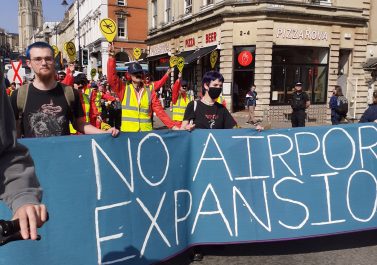Comrades in Croydon Solidarity have written up the following answers to a set of questions to explain their recent organising/political experiences. We think we need an honest assessment of where we’re at, and what would be needed to push past the limitations that we face all too often. The common symptom for these limitations is often ‘burn-out’. On the left, we often go gung-ho into a project, but without a wider perspective and analysis, and with class action at a low ebb, it is easy to become demoralised. The idea of these mini-interviews is to bring some of these specific issues to the surface so that we can think more strategically about how to overcome them. The LetsGetRooted collective have some kind of strategy in mind, based in and around larger workplaces. If you want to take part in this discussion, and actually do something with a small group in your local area, contact us!
Here is the first issue of their local newsletter: https://croydonkickoff.wordpress.com/2020/06/07/taking-root/
Based on your recent local experiences of ‘being part of a group’ (organising around a specific issue, reading circle etc.) what were your good and bad experiences? Where did you hit a brick wall in expanding both the practical activity and its roots as well as the political horizon of the group? And where did things work really well and push things forward? In case you are in a group: What is your group’s capacity for practical involvement? Can it commit to run a monthly/fortnightly solnet? Can it maintain a regular (at least monthly) presence at a strategic workplace for a prolonged period?
D: I believe our good experiences so far have mostly been around the fact we are organising (or trying to) with workers who are of strategic importance to the wider economy. What I mean by this is workers whose labour plays a very obvious role in supplying essential goods to the wider population. Perhaps coronavirus has shone an even brighter light on this. It’s early days, but I think the thing that we’re struggling with is ultimately the fact that we don’t have anyone firmly rooted in those workplaces. To date we are therefore relying on leafleting from outside, something that I believe is viewed suspiciously by workers (understandably so!)
A: Only considering my recent experience as a member of IWW and my participation in the drivers campaign last year, besides I think it was partially successful we definitely hit the proverbial brick wall when we failed to engage more drivers to become organisers themselves. Actually there were a few drivers that were doing a really good work organising their colleagues, talking to them, encouraging them to strike and so on. But there were not enough of them, so when they stop working in the same areas or change job because of the motorbikes ban in Swiss Cottage things fell apart quite fast. At the end we were relying in a few comrades working their asses off to move things forward. At the end it proved not to be sustainable in the long run.
M: The major concern for me is people on the left sitting around talking about revolution and spending too much time on emails and zoom calls. If you don’t know any Romanians from the warehouses then what do you really know about the working class? That’s why groups like AW in the UK or Workers’ Initiative base union in Poland are important, because at least they do things.
T: My recent organisational experiences come from 6 and half years of being active in the IWW. The good experiences were all organising projects that made a serious attempt to engage with working class sectors and that moved beyond the ‘build the organisation’ mentality of the union.
In Sheffield I was part of a small group that salted the Greggs food chain for around a year and made a concentrated effort to map and engage with the local hospitality industry. We translated posters into Urdu, Polish and Mandarin, fly-posted the areas and made some contacts with workers working illegally. At the same time, another salting project at a major door manufacturing plant brought other interesting experiences. In London, the IWW – Angry Worker organising drive in West London in 2017-2018 and the courier strikes in late 2018 were both exciting experiences that had real potential to go beyond stale left wing union activity, though both ultimately didn’t see any major successes beyond the political development of those involved (which is important).
The brick wall was a combination of the following:
- Organisation-building fetishism, where building the union had become the end rather than the means.
- A lack of political education and reflection on trends within the class and in capitalism.
- The political organisation was held together by vague ideological principles instead of practical strategy and methods.
- Members were thinly dispersed geographically and were not rooted in places where they could exercise power.
- People were not able or willing to seriously commit to ground work.
Things were at their most exciting when we:
-Shelved any focus on building the union and focused on building the class, so to speak.
-Concentrated our resources.
-Focused on specific industries or geographical areas.
-Took risks to maintain a more progressive stance (e.g. publicly supporting striking couriers who had been brawling with their attackers).
If ‘getting rooted’ means to act within ‘working class areas’ and around ‘interesting workplaces’ and ‘common issues’, what could that mean in your area?
Based on our recent experiences, there are concerns in the group about the mid-long term sustainability of the project. In order for it to be successful we need to either get jobs in the types of workplaces we are targeting or / reach out and build solid links with the people already working there. So far we are trying both of these, within the limits of our group’s capacity. There are also concerns about this being a bit back to front – if we each focused on the area we were already in, we would naturally be more rooted. However, we this is all about picking strategic areas, and so these trade offs are the nature of the game.
Are there people you know who are also interested in engaging in a practical / theoretical process like this? If not, why do you think that is?
It’s clear that projects like the Angry Workers’ inspire people to get involved once you have something to show for it. There is a pattern of people appreciating the ‘real’ work of these projects, which speaks to the disconnected nature of the UK Left from the class. We are slowly gaining traction in Croydon and hope to keep building on this.
However, some of the reasons why we think people don’t get involved in this kind of work more are:
- They may feel that they ‘belong’ to existing structures and projects. When people have been in an organisation for a long time, there is a danger of them becoming uncritical and absorbed in the bureaucratic procedures that form over time, often at the expense of organising and achieving goals.
- There is an issue with people already involved in radical projects being from a middle class background, and the challenge is engaging working class people in a grassroots autonomous group. We lack the language and methods for communicating our project to local working class militants to the point where they are willing to take an active role in our work.
- There is a lack of political and cultural education around capitalism and communism on the UK Left.
- People are burned out by the failures of UK anarchist projects from anti-globalisation to climate activism to Occupy, IWW/Solfed etc. This is why the Corbyn movement has pulled in a lot of people who may have been interested in our work.
- We could still improve in explaining what our project is and the thinking behind this. What is our pitch to people in a few clear lines?
- We need a strong way to answer the question of why people should get involved in the hard and thankless work of this project instead of the comparatively easy and seemingly rewarding work of Labour (or for that matter, UVW, IWGB, IWW).
- We should outline what our longer-term strategy is and how the current project fits into that. This would further help explain to people why this is the kind of work they should get involved with.
Have there been any interesting struggles within the local class recently? What could a fruitful organised support have looked like?
- We have heard recent reports of immigration raids on the Croydon Amazon, with Amazon being complicit in tricking their workers into coming into the trap.
- 2019 ASLEF strike of Croydon tram drivers – one of our contacts went to this. The tram depot is on the Croydon industrial estates, and workers from the different warehouses and factories will use the tram to get to work.
- 2019 UCU college strike in Croydon – one of our contacts went to this. UCU here is dominated by SWP politics.
- 2018 Thornton Heath courier strikes. This was a militant area of Brazilians but then things fell apart with infighting.
- Further back there’s the London riots, which were pretty iconic in Croydon…
Another question these responses raise is how to sustain your political work. We seem to be living in a era where ‘things fall apart’ – frequently and easily. As the AngryWorkers’ experiences from west London demonstrate, we don’t get ‘quick results’. This pushes more people into seemingly ‘quick fixes’ – the Labour project being the main one, trade union membership the other. However, we keep coming back to the same thing: without an independent, confident working class, who can articulate what we want and more importantly, are willing to fight to get it, our demands and hopes will never be met. This power cannot be ‘bestowed’ on us. We have to take it, with both hands. This is what our organisational proposals seek to address. Check out our year-long work plan on this website!


